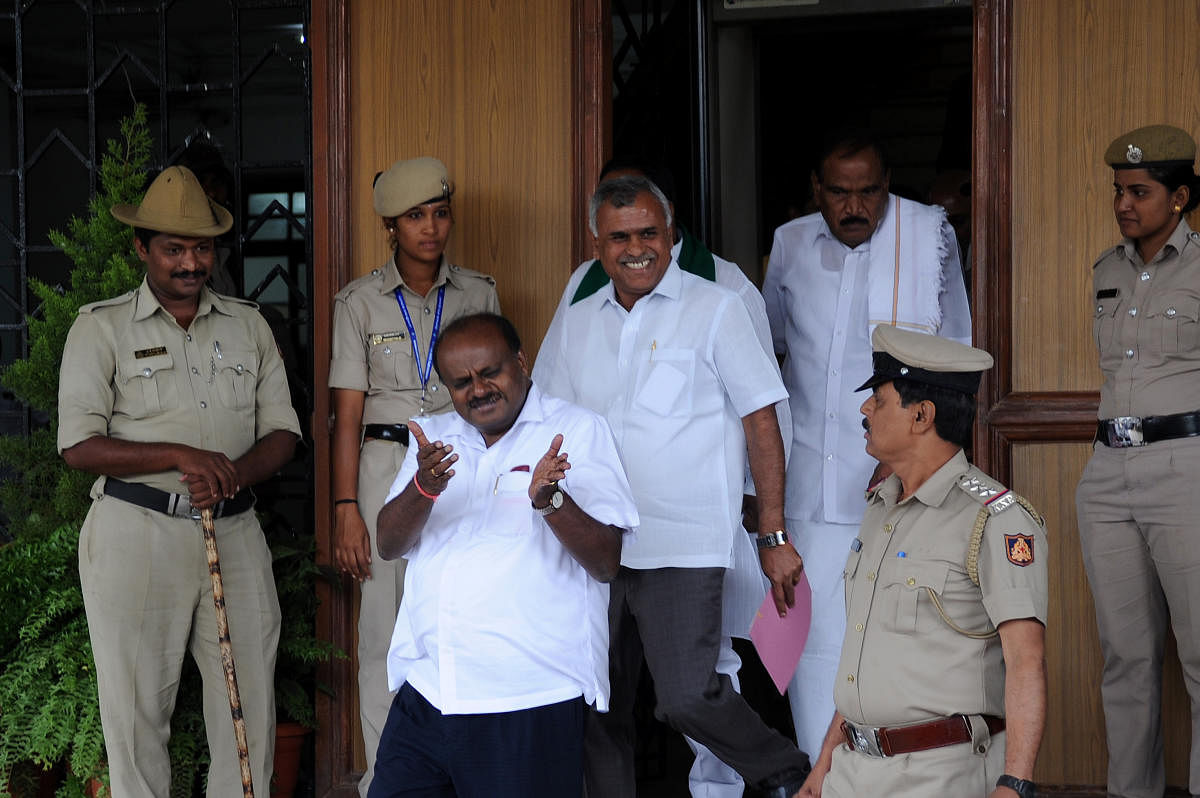
What shall we say about the ongoing drama in the corridors of power in Bengaluru right now? Many of us are asking that question as we remain spectators with an urge to speculate where and with whom power, the monster, is going to reside henceforth.
No doubt the political drama unfolding since the last few weeks following the result of parliamentary elections in Karnataka was expected. But, did we expect such a dénouement? Unfortunately, it consists only of egoistic pursuits for the sake of retaining or regaining power by any means, mostly foul. It reminds us of famous quotes: “Politics is the art of the possible, the attainable — the art of the next best,” as Otto von Bismarck, the Prussian statesman said; “all power tends to corrupt, and absolute power corrupts absolutely,” as Lord Acton, the British historian, noted; and, “politics is the last resort of scoundrels,” as the truism of George Bernard Shaw, the Irish-English playwright, goes.
It is clear that there is little scope for moral cleansing. The rottenness we see all around is bound to be there all along even if the BJP comes to power. This is the tragedy of democracy in Karnataka today, although this is not the first time that such a scenario prevails in the state, thus making us doubly cynical, which is detrimental to democracy.
Who is to be blamed for this plight? It would be naive to pretend to find an answer. The intention and rush with which the coalition government was formed last year meant that the coalition, aimed at preventing BJP from forming government, was viewed to be a short-term measure, not to go beyond the parliamentary elections. The coalition partners, Congress and JDS, in their double-speak, were very vocal — for public consumption — that the coalition would last the full term. The culpability for this plight lies majorly with the egoistic selves of the big names involved in that coalition, less said the better about who they are.
The political implications of the ongoing drama are disastrous for both coalition partners. The JD(S) family that grabbed the opportunity, given out of desperation by Rahul Gandhi, has become a laughing stock, all the more so after the defeat of both HD Deve Gowda and Nikhil Kumaraswamy. The state Congress, which started indulging in all sorts of sabotage from within, mainly because of bloated or hurt egos, has contributed shamelessly to this state of affairs and to the self-destruction of India’s grand old party as well.
The BJP, sitting pretty at the moment by virtue of its money power and the clout from its headquarters and its cadres in Mumbai, is willing to stoop to any level to ensure that it comes to power at the earliest, by all means, fair or foul. The putative chief-minister-in-waiting has reminded everyone that he is “not a sanyasi, detached from power.”
The rebels, along with those who alienated them from power-sharing and those who goaded them, with or without inducements, towards rebellion, are the prime movers of the ongoing sham. The damage done to the cause of ‘coalition dharma’, to ethics in politics, by the resignation drama enacted by the rebels from both Congress and JD(S) is evident. How many times can the Supreme Court intervene in these matters?
The repercussions will be felt elsewhere, too, with the Congress party bearing the brunt, as if the drubbing it received in the parliamentary elections was not enough. It has already happened in Goa, and it could happen even in Punjab. The ‘winner’ will be the BJP, which goes on both accumulating and arrogating power to itself so as to usher in, perhaps, ‘one nation, one party, and no election’ in the years to come.
While out on a stroll in Mysuru yesterday, I overheard a Karnataka State Reserve Police (KSRP) constable walking alongside his colleagues, saying in Kannada, “ee (expletive)makkalu duddgoskara rajakiyana ishtu haalu madbitralla!” (For the sake of money, these people have sunk the quality of our politics so low.” It summed up the common perception about the ongoing political drama.
Guarding our democracy
All this must make us reflect on our democracy and who should be its guardians. The impudence with which our so-called leaders behave, the money-power they exhibit with their resort politics and five-star hotel stays, waiting for the change of reins to happen, and the abject indifference they show towards their respective constituencies and the state’s larger issues, particularly during political crises caused to ensure that they are counted among the ‘power centres’, are all nasty signifiers of how far they are removed from the people and their concerns. They cannot be the guardians of our democracy.
If many of us, concerned about democracy, are aware that tainted democracy benefits a few, and those few happen to be politicians who use every inch of it to further their own self-interest, are we not permitting ourselves to be fooled, happy to merely comment that our democracy has become the first resort of scoundrels?
In such a blighted scenario, who can be the guardians of true democracy? Can we the common people, who are most of the time treated as mere objects and whose activism does not move beyond private gossip or comment, be the guardians? Can the intelligentsia – the legal fraternity, the media, the NGOs, etc — move the masses towards informed engagement with the polity and to protest against the current state of affairs? Otherwise, we may tell ourselves, “thus the people, so our leaders”, or vice versa.
(The writer is a Professor of English)